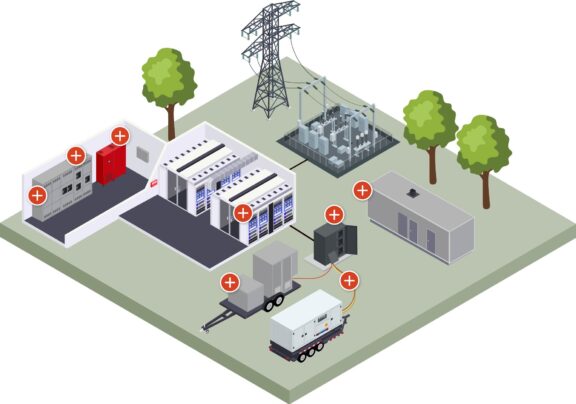
An uninterruptable power source (UPS) is used to calculate whether or not your electrical or IT equipment is capable of running during a power outage. The UPS provides a few minutes of short-term backup power to your equipment using batteries that have stored energy for this very purpose.
A UPS can also address glitches and equipment failure, but remember that it is not usually capable of supporting heavy loads of electricity that may be required by items like fire pumps or cooling equipment. Just as a generator uses diesel fuel to provide power, a UPS uses batteries that must be regularly tested to ensure that they can handle connected appliances.
Read more about how to test a UPS system with a load bank test and why it’s important.
What Is UPS Load Testing
Load testing examines the power sources to see if they can provide the right amount of power your equipment needs. To do so, a load bank test is conducted. Load banks are a device containing electrical load elements, individual controls and a built-in cooling system. The power is delivered to the load bank, which applies the load to the power source and converts the output. The electricity produced can be tested to ensure the equipment is safe and reliable.
The Importance of UPS Systems
UPS systems are essential for companies to prevent downtime and damage due to faulty equipment. In areas that may experience electrical fluctuations, it is necessary to consider how small changes can affect devices and appliances.
The size of your UPS may depend on how much emergency power you may need in your building. A small UPS may provide up to 15 minutes of power, whereas a more significant UPS could supply a greater number of charges. You must consider the size of UPS you may need to optimize its use. Try to connect the UPS system to your most essential pieces of equipment and servers, avoiding the less important appliances like coffee machines or printers.
Why Test a UPS System?
Testing a UPS system regularly is crucial to ensure it can provide your essential equipment power during electrical outages. As such, it is often placed between the backup power generators and any IT equipment it needs to protect. Both industries like data centers and their respective customers rely on continuity to keep their business operations running. Companies can use load banks to test the UPS and ensure the system works efficiently.
UPS tests will assure you that your system and batteries are performing well while allowing you to test the UPS with an electrical load that won’t risk the equipment itself. Load bank testers can confirm that the system works without your building having to experience an actual outage, offering you peace of mind. When power outages do occur, these tests can help you feel better about how your UPS system will respond.
The UPS Battery Testing Process
The testing process will require a trained professional to visit your facility and ensure that the UPS works correctly. Consider exploring the testing process and understanding the results to make the most out of your UPS test.

How to Test a UPS
A UPS test is mainly performed under two different circumstances — during a data center commissioning process or during preventative maintenance. The commissioning process allows the battery’s voltage to equalize and fully charge. A supplier often recommends that testing be conducted a week after commissioning.
During preventative maintenance, the condition of the batteries is evaluated, and potential issues are addressed. A load test will tell you if batteries need to be replaced or if the UPS can maintain a good amount of power for your equipment.
The Results
Measurements are taken and recorded during the process that businesses can later analyze to fix any issues. While these results can be used as part of the final report, you can also use them to test local generators. Here are a few ways that UPS test results may help your facility:
- Battery performance: Consider whether the battery needs to be replaced or the system can still handle a power outage.
- Identify problems and weaknesses: Identify issues promptly and deal with faults in the machine.
- Take action: After identifying problems, you can immediately take action and fix whatever is broken or needs maintenance.
- Track engine ability: Consider the engine’s current ability to provide power.
- Track alternator capability: Consider whether or not the alternator can provide voltage stability.
- Check oil and fuel pressure: Issues in oil or fuel pressure can be fixed as soon as they are uncovered.
- Remove deposits: Results may tell you if you need to clear fuel or carbon deposits around the UPS pistons or exhausts.
- Seek advice: If the issue needs to be addressed by a professional, you can consult expert advisors.
Load Banks for UPS Testing
There are a few different types of load banks that may be best for UPS testing. Consider what load bank may be appropriate for your UPS and your facility before making a final decision.
AC and DC Resistive Load Banks
Depending on your requirements, companies may use an alternating current (AC) or direct current (DC) resistive load bank for different scenarios. Typically, resistive load banks can test equipment that produces an alternating or direct current, like generators or turbines.
Reactive Load Banks
Reactive load banks tend to be larger or heavier than other load banks. They can test systems that are affected by motors or electromagnetic devices, such as transformers or capacitors.
Some examples of reactive load banks include reactive-inductive and reactive-capacitive load banks. Reactive-inductive loads convert the electrical current into a magnetic field for equipment like motors or transformers. Reactive-capacitive loads charge and release energy with devices that use solar or telecommunication.

Test Your UPS System With Help From LBD
Load Banks Direct is a leading manufacturer of load quality load banks and products that offer competitive prices and expert assistance. With over 100 years of combined experience, our team of professionals is dedicated to bringing you the best testing systems for your business.
Our company has worked with various industries and offers a wide selection of products such as stationary, portable, mobile and mounted load banks. We also work hard to provide customizable options that fit your needs. Through superior customer service, we are an industry-leading manufacturer that designs compact and lightweight testing systems used for generators, turbines, battery systems and motor applications around the country.
Contact us today to learn more about our offerings.
We Are Here
To Help
Our team is here to support you and solve your power challenges. Connect with our responsive experts today to learn about our customized power solutions and products.


